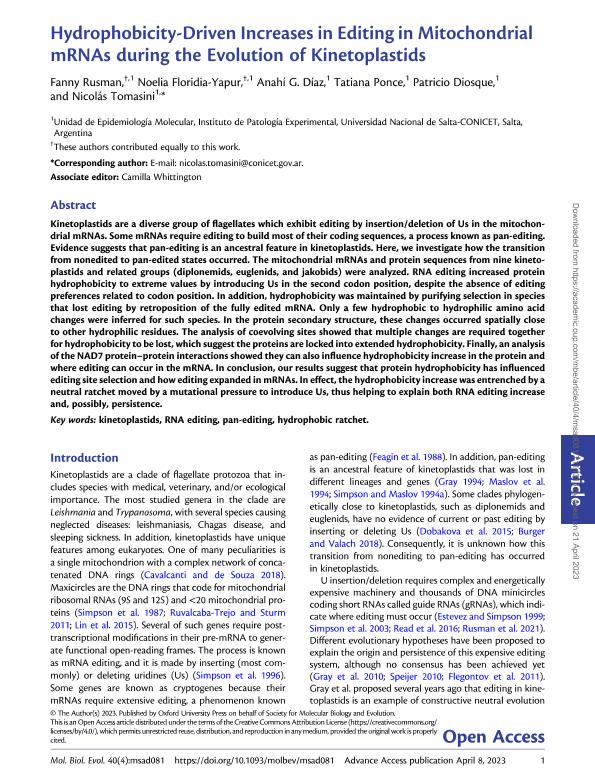Artículo
Hydrophobicity-driven increases in editing in mitochondrial mRNAs during the evolution of kinetoplastids
Rusman, Fanny ; Floridia Yapur, Noelia Aldana del Rosario
; Floridia Yapur, Noelia Aldana del Rosario ; Díaz, Anahí Guadalupe; Ponce, Tatiana Macarena Evelin
; Díaz, Anahí Guadalupe; Ponce, Tatiana Macarena Evelin ; Diosque, Patricio
; Diosque, Patricio ; Tomasini, Nicolás
; Tomasini, Nicolás
 ; Floridia Yapur, Noelia Aldana del Rosario
; Floridia Yapur, Noelia Aldana del Rosario ; Díaz, Anahí Guadalupe; Ponce, Tatiana Macarena Evelin
; Díaz, Anahí Guadalupe; Ponce, Tatiana Macarena Evelin ; Diosque, Patricio
; Diosque, Patricio ; Tomasini, Nicolás
; Tomasini, Nicolás
Fecha de publicación:
04/2023
Editorial:
Oxford University Press
Revista:
Molecular Biology and Evolution
ISSN:
0737-4038
Idioma:
Inglés
Tipo de recurso:
Artículo publicado
Clasificación temática:
Resumen
Kinetoplastids are a diverse group of flagellates which exhibit editing by insertion/deletion of Us in the mitochondrial mRNAs. Some mRNAs require editing to build most of their coding sequences, a process known as pan-editing. Evidence suggests that pan-editing is an ancestral feature in kinetoplastids. Here, we investigate how the transition from nonedited to pan-edited states occurred. The mitochondrial mRNAs and protein sequences from nine kinetoplastids and related groups (diplonemids, euglenids, and jakobids) were analyzed. RNA editing increased protein hydrophobicity to extreme values by introducing Us in the second codon position, despite the absence of editing preferences related to codon position. In addition, hydrophobicity was maintained by purifying selection in species that lost editing by retroposition of the fully edited mRNA. Only a few hydrophobic to hydrophilic amino acid changes were inferred for such species. In the protein secondary structure, these changes occurred spatially close to other hydrophilic residues. The analysis of coevolving sites showed that multiple changes are required together for hydrophobicity to be lost, which suggest the proteins are locked into extended hydrophobicity. Finally, an analysis of the NAD7 protein-protein interactions showed they can also influence hydrophobicity increase in the protein and where editing can occur in the mRNA. In conclusion, our results suggest that protein hydrophobicity has influenced editing site selection and how editing expanded in mRNAs. In effect, the hydrophobicity increase was entrenched by a neutral ratchet moved by a mutational pressure to introduce Us, thus helping to explain both RNA editing increase and, possibly, persistence.
Palabras clave:
HYDROPHOBIC RATCHET
,
KINETOPLASTIDS
,
PAN-EDITING
,
RNA EDITING
Archivos asociados
Licencia
Identificadores
Colecciones
Articulos(IPE)
Articulos de INST.DE PATOLOGIA EXPERIMENTAL
Articulos de INST.DE PATOLOGIA EXPERIMENTAL
Citación
Rusman, Fanny; Floridia Yapur, Noelia Aldana del Rosario; Díaz, Anahí Guadalupe; Ponce, Tatiana Macarena Evelin; Diosque, Patricio; et al.; Hydrophobicity-driven increases in editing in mitochondrial mRNAs during the evolution of kinetoplastids; Oxford University Press; Molecular Biology and Evolution; 40; 4; 4-2023; 1-14
Compartir
Altmétricas



